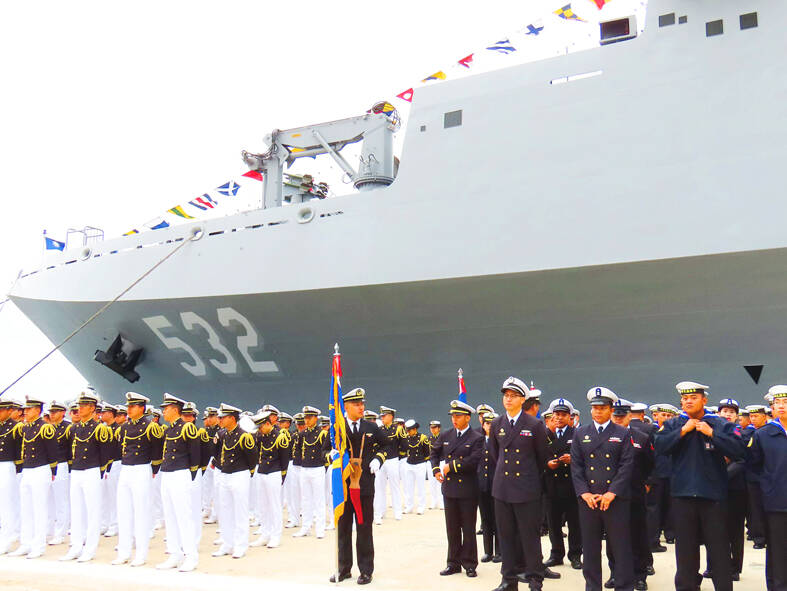Taiwan has signed three contracts with the US worth NT$10.69 billion (US$329 million) to procure spare parts for its air force and navy, the government said yesterday.
According to a notice on the Government e-Procurement System, the deal to procure “standard” and “nonstandard aviation parts and accessories” and “ship parts and accessories” was signed by the Ministry of National Defense’s Defense Mission to the US and the American Institute in Taiwan (AIT).
The notice said the contracts are valid from the day they were signed until the second half of 2026.

Photo: Liu Yu-ching, Taipei Times
The equipment included in the purchase would be used by the air force and navy at facilities in Pingtung, Kaohsiung and Tainan, the notice said.
In other news, the National Audit Office’s report for the first half of the year showed that of the ministry’s 238 projects planned for this year, 62 had not received funding and 49 funded projects had not yet reached 90 percent implementation.
According to the office’s report, the ministry projects had a total budget of NT$136.50 billion and could allocate NT$7.33 billion, or 5.38 percent of its budget, to 62 projects.
The 49 projects funded that have not reached a 90 percent completion rate, which include the purchase of new tanks, were given NT$16.45 billion, or 12.06 percent of the year’s total, the report said.
The ministry had six months to act on its budget, and little progress was made on projects waiting for funding and ongoing projects, the agency said.
The agency said it had notified the ministry to make budget plans and review why budget implementation has been behind schedule.
In response, the ministry said it planned to fund its projects in the second half of the year.
The ministry said it had ordered its units to step up oversight and project management to realize a 90 percent completion rate.
Through budget reallocation and project reviews, it aims to reduce the risk of projects falling behind schedule, the ministry said.

NATIONAL SECURITY THREAT: An official said that Guan Guan’s comments had gone beyond the threshold of free speech, as she advocated for the destruction of the ROC China-born media influencer Guan Guan’s (關關) residency permit has been revoked for repeatedly posting pro-China content that threatens national security, the National Immigration Agency said yesterday. Guan Guan has said many controversial things in her videos posted to Douyin (抖音), including “the red flag will soon be painted all over Taiwan” and “Taiwan is an inseparable part of China,” while expressing hope for expedited “reunification.” The agency received multiple reports alleging that Guan Guan had advocated for armed reunification last year. After investigating, the agency last month issued a notice requiring her to appear and account for her actions. Guan Guan appeared as required,

DAREDEVIL: Honnold said it had always been a dream of his to climb Taipei 101, while a Netflix producer said the skyscraper was ‘a real icon of this country’ US climber Alex Honnold yesterday took on Taiwan’s tallest building, becoming the first person to scale Taipei 101 without a rope, harness or safety net. Hundreds of spectators gathered at the base of the 101-story skyscraper to watch Honnold, 40, embark on his daredevil feat, which was also broadcast live on Netflix. Dressed in a red T-shirt and yellow custom-made climbing shoes, Honnold swiftly moved up the southeast face of the glass and steel building. At one point, he stepped onto a platform midway up to wave down at fans and onlookers who were taking photos. People watching from inside

A Vietnamese migrant worker yesterday won NT$12 million (US$379,627) on a Lunar New Year scratch card in Kaohsiung as part of Taiwan Lottery Co’s (台灣彩券) “NT$12 Million Grand Fortune” (1200萬大吉利) game. The man was the first top-prize winner of the new game launched on Jan. 6 to mark the Lunar New Year. Three Vietnamese migrant workers visited a Taiwan Lottery shop on Xinyue Street in Kaohsiung’s Gangshan District (崗山), a store representative said. The player bought multiple tickets and, after winning nothing, held the final lottery ticket in one hand and rubbed the store’s statue of the Maitreya Buddha’s belly with the other,

‘NATO-PLUS’: ‘Our strategic partners in the Indo-Pacific are facing increasing aggression by the Chinese Communist Party,’ US Representative Rob Wittman said The US House of Representatives on Monday released its version of the Consolidated Appropriations Act, which includes US$1.15 billion to support security cooperation with Taiwan. The omnibus act, covering US$1.2 trillion of spending, allocates US$1 billion for the Taiwan Security Cooperation Initiative, as well as US$150 million for the replacement of defense articles and reimbursement of defense services provided to Taiwan. The fund allocations were based on the US National Defense Authorization Act for fiscal 2026 that was passed by the US Congress last month and authorized up to US$1 billion to the US Defense Security Cooperation Agency in support of the